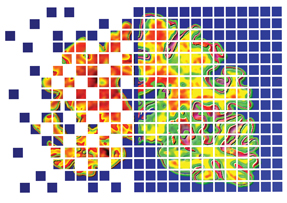Alzheimer's markers make management tougher
New guidelines and diagnostic advances are identifying Alzheimer's disease and its precursors much earlier in the course of the disease. The bad news is that, for now at least, these improvements may only create more dilemmas for general internists for the role of biomarkers and communicating with patients.
The good news is great advances are being made in diagnostics for Alzheimer's disease and its precursors. The bad news is that, for now at least, these improvements may only create more dilemmas for general internists.
New guidelines on diagnosis were released earlier this year by the Alzheimer's Association and the National Institute on Aging. The guidelines differed from previous editions in their inclusion of biomarker testing and the diagnostic category of mild cognitive impairment (MCI) due to Alzheimer's. The biomarkers, in particular, attracted widespread public attention, with their potential to “indicate the very earliest signs of disease,” as a press release from the Alzheimer's Association said.

The guideline writers cautioned that the new tests and the category of MCI due to Alzheimer's are intended for research, not clinical, uses, but the publicity has raised debate among clinicians and researchers. What's the proper role for biomarkers now and in the future? How useful are tools for earlier diagnosis without parallel advances in therapy? How should physicians communicate with patients about these issues?
Biomarkers
The biomarkers discussed by the guidelines have shown effectiveness at identifying the presence and progression of Alzheimer's disease. Some relate to pathophysiology, such as the accumulation of beta-amyloid protein in the brain, said Guy McKhann, MD, lead author of the dementia portion of the guidelines and a professor of neurology at Johns Hopkins University in Baltimore.
Researchers have measured the protein through positron emission tomography (PET) scans and cerebral spinal fluid tests. Other biomarker research has focused on Alzheimer's effects on the brain, including changes in brain volume or the size of the hippocampus. The results of these tests could be used not only to track the course of the disease, but also to diagnose Alzheimer's long before it has any noticeable effects on a patient's cognitive abilities.
“In a research setting, we know how to use [the biomarker tests] and we are working out what they really mean,” said Dr. McKhann. “The problem for the practicing internist in terms of these biomarkers is, in general, they are not ready for prime time.”
The experts unanimously agreed that biomarker testing belongs in research, not practice. But patients have not necessarily gotten the message. “Because it's gotten a lot of hype, I've had a number of patients who've asked for them,” said C. Bree Johnston, FACP, professor of geriatrics at the University of California, San Francisco. “I usually try to talk them out of it.”
Currently, there are a number of effective arguments against the tests. Some of the tests aren't widely available yet, and even if a local facility could conduct them, the meaning of the results would be unclear.
“There's still uncertainty about how to interpret them, but even more, there's no standardization,” said Marilyn Albert, PhD, lead author of the MCI section of the new guidelines and director of the Johns Hopkins Alzheimer's Disease Research Center. “If you have cerebral spinal fluid measured in one hospital, the measures are going to be different from another one. If you have somebody look at an MRI scan and measure it with one software package, it's going to be different from another.”
However, efforts at standardization are underway, and recent FDA approval of an imaging isotope with a longer half-life may expand access to testing. “It's quite conceivable that a year from now there are going to be a lot of centers that can do amyloid imaging,” said Dr. McKhann.
Advances in the accuracy of the biomarkers would also be required before they could be brought into practice.
“The tests being developed will eventually be a wonderful advance, but they are still in the developmental stage with unproven reliability, accuracy and predictive power,” said Allen Frances, MD, former chair of the task force that wrote the Diagnostic and Statistical Manual of Mental Disorders, 4th edition (DSM-IV) and now a columnist and professor emeritus of psychiatry at Duke University in Durham, N.C.
Dr. Johnston agreed. “They aren't sensitive or specific enough to help us predict who is going to get worse. They aren't sensitive or specific enough to give us a better idea about who has Alzheimer's disease versus another type of dementia,” she said.
Assuming the tests can be refined, some experts still have concerns about their application to practice. “Even when tests are eventually proven to be reasonably accurate in diagnosis, it is quite likely there will still be no effective treatment,” said Dr. Frances.
Diagnosis without treatment
Even if biomarkers could identify very early stages of Alzheimer's disease, the absence of effective treatments raises questions about the potential value of the tests for patients and for the health care system as a whole.
“I don't see a lot of use in the short term for some of these high-tech technologies, such as biomarkers, CSF [cerebrospinal fluid] markers, PET scans. These are all very, very expensive modalities,” said Frank Molnar, MD, associate professor and director of research in the department of geriatrics at the University of Ottawa in Canada.
Dr. Frances added, “I question whether it is wise to invest heavily in a diagnostic test that will have no impact on treatment when there are so many other health needs that are desperately underfunded. This concern is heightened further by the likelihood that the tests will be only partially accurate and predictive and that patients testing positive will be more harmed by needless worry than helped by knowing their presumed prognosis.”
Dr. Johnston agreed with concerns about biomarkers' value, but she noted the major caveat. “This will change if we have disease-modifying agents. Then the biomarkers become very important,” she said.
Some experts were optimistic on this point. “The drug companies are working hard on this,” said Dr. McKhann. “There is increasing feeling that if we're going to alter this disease with therapy, it's going to have to be done earlier than it is now .... Ideally we'd identify someone in the presymptomatic phase and that's when we would introduce a treatment. That's our long-term goal.”
Mild cognitive impairment
Physicians can already identify people who are likely to become Alzheimer's patients but haven't developed dementia. This group is considered to have mild cognitive impairment, the other significant development of the new guidelines. The guidelines' MCI section offers research criteria for the diagnosis, which includes biomarkers, and clinical criteria to be used in practice.
The clinical criteria require a report of change in cognition from the patient, the physician or a family member and objective evidence of cognitive decline. The definition of MCI excludes patients who are no longer independently functional due to cognitive loss (their diagnosis is dementia) and those whose problems have a non-Alzheimer's cause.
Depression can look much like Alzheimer's, experts noted, and a trial of an antidepressant may be worthwhile in some patients. Other patients with cognitive symptoms may just be suffering the effects of age.
“Some degree of mild cognitive impairment is a fairly ubiquitous accompaniment of aging and is difficult to distinguish from what may be early signs of Alzheimer's,” said Dr. Frances. The guidelines also emphasize the need to consider other differential diagnoses such as vascular disease or Lewy body dementia.
Dr. Albert described the goals of an MCI workup. “You try to be sure that somebody had some progressive declines in cognition and rule out other medical conditions that might cause that problem, such as stroke or infection. You're increasing the likelihood that the cause is a neurodegenerative disease, but you don't have a good degree of certainty,” she said.
That uncertainty affects even the name of the disease. The relevant guideline section is titled “The diagnosis of mild cognitive impairment due to Alzheimer's disease” but the latter part of the description is intended for the research arena, according to Dr. Albert. “I would be very loathe to use the term Alzheimer's disease [for a patient with MCI],” she said.
A diagnosis of MCI has more significance in the lab because clinicians don't currently have any data to support the use of available therapies, said George Grossberg, MD, director of geriatric psychiatry at Saint Louis University in Missouri.
“Let's say we diagnose MCI. What are we going to do about it?” he asked. “Not a whole lot, because it looks like the cholinesterase inhibitors, with or without Namenda (memantine), don't seem to make much of a difference either in decreasing the rate of conversion to Alzheimer's disease or in providing significant improvement.”
Patients with MCI are at higher than average risk of progressing to Alzheimer's dementia, but not all of them will develop the disease. However, Dr. Grossberg cautioned, that doesn't mean that physicians should give up on diagnosing MCI. Another common complaint among the experts was underdiagnosis of Alzheimer's.
“I'm frustrated that the diagnosis isn't getting made very much,” said Dr. Johnston. “It doesn't make it onto the problem list, even though it's often the patient's biggest problem.”
Dr. Molnar added, “In a lot of our hospitals, the patients who do not do well are often the people who come in with pneumonia, heart failure, diabetic complications, but underlying that they have cognitive issues. What we find is there are more and more patients who have difficulty managing their chronic illness because of an underlying dementia.”
It's not the unavailability of biomarker testing that is preventing these patients from being diagnosed. “All of the tools are there right now. I'm not worried about the tools,” said Eric Tangalos, FACP, an internist at the Mayo Clinic's Alzheimer's Disease Research Center in Rochester, Minn. “It's a reluctance on the part of families to make a diagnosis and it's a reluctance on the part of physicians to make a diagnosis.”
Physicians may be reluctant to diagnose patients with Alzheimer's for a number of reasons. “When physicians engage in a discussion of Alzheimer's disease, it opens an entire Pandora's box of questions and answers. It's not simply making a diagnosis. It's changing the future of an individual,” said Dr. Tangalos.
And there are few rewards for opening that box. “People feel like they aren't going to be reimbursed adequately for doing a mental state exam. I think that many practitioners feel that it's somewhat futile ... those are all reasons that contribute,” said Dr. Johnston.
Futility is falling
But among experts, at least, the futility excuse is losing ground, according to Dr. Grossberg. “I think the ‘Why bother?’ school is losing out,” he said. “Most experts who are doing this type of work every day, and I think the recent literature supports this as well, seem to believe that it does make a difference [in confirmed Alzheimer's cases] to get people on cholinesterase inhibitors, for example, early.”
Research, including several recent trials by the National Institutes of Health, has shown that the drugs slow disease progression in patients with Alzheimer's dementia. But it's unclear exactly how early to start them, since trials have not found evidence of benefit in patients with MCI. “The therapies that are available can be tried. Whether they'll work or not, I don't know,” said Dr. Grossberg.
Some recommendations, however, can definitely be given to a patient diagnosed with the potential Alzheimer's precursor. “That individual at the very least can begin to do things as far as a healthy lifestyle and trying to modify certain risk factors,” said Dr. Grossberg. “We can emphasize lifestyle and diet and exercise. There's no downside obviously to clinicians recommending all those healthy things to their older patients.”
A patient's cognitive decline should also be considered in treatment of any comorbidities. “For example, if somebody has high blood pressure but they forget to take their medicines, they're going to be sicker,” said Dr. Albert. Medication regimens should be simplified and family members should get involved in care. “Maybe you can't cure the underlying disease, but you can prevent an awful lot of difficulty,” she said.
The MCI diagnosis may also offer an opportunity to plan for the future. “It's very important to do advanced care planning, for patients to get their durable power of attorney for health care, get their finances in order, talk with their family and loved ones about their wishes for their future medical care,” Dr. Johnston concluded.





